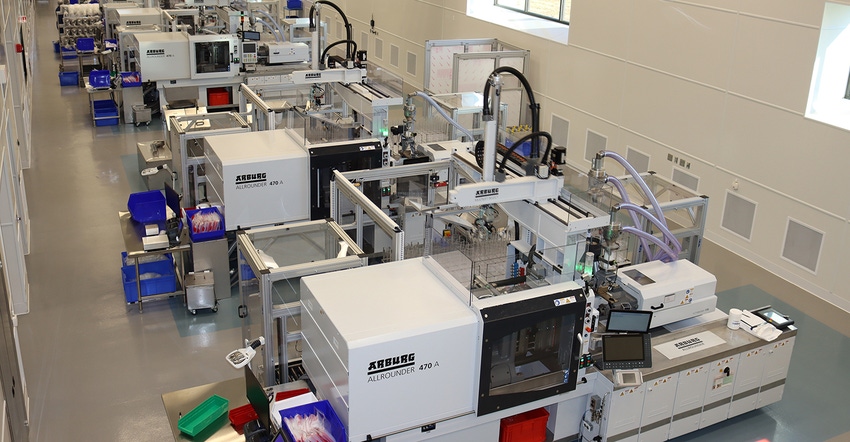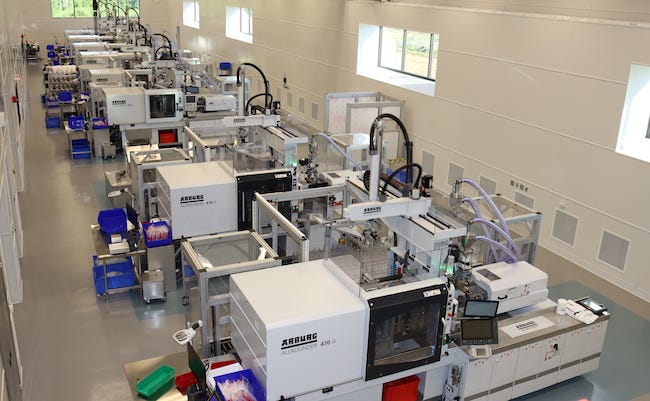Established in September 2019, the supplier of precision molded parts for medical applications has doubled its press capacity and recycled or reused close to 100% of waste material.
August 26, 2020

When mold maker and supplier of injection molding services Plastikos decided to launch Plastikos Medical, the operation’s potential environmental impact was a key part of the initial conversation. One of the agreed-upon standards was to develop a method of reusing or recycling 100% of waste material produced by the runner systems. The facility itself was designed to accommodate automation of the segregation, reprocessing, and storage of regrind to minimize material handling and direct labor. Plastikos Medical officially opened its doors in September 2019 providing OEMS with precision molded products for Class II and Class III medical devices. Plastikos issued a press release this week reporting on the business and environmental accomplishments of the young company, and they are notable.
Since opening last year, Plastikos Medical has doubled its press capacity and consumed approximately 160,000 pounds of raw material in 2020. Of that total raw material consumption, approximately 100,000 pounds were used to mold finished medical parts. The remaining 60,000 or so pounds were entirely reused or recycled through multiple partnerships.
“Our first goal is always to reduce raw material consumption,” said Ryan Katen, General Manager of Plastikos Medical. “We work hand-in-hand with our clients up front to utilize full hot-runner systems where viable. However, there are times when the customer’s product design and corresponding part geometry do not allow for that type of runner-less system. In those unique cases, we often need to build a small cold runner or hybrid system,” explained Katen. “Even with a hybrid system, the waste from small, partial cold runners can really add up when the volume is extremely high, as we see in many single-use medical devices. Nearly 99% of the reusable regrind material that we produce at Plastikos Medical is generated via a hot-to-cold runner system.”
Katen also noted that Plastikos Medical works with several recycling business partners that will either purchase or take the high-quality regrind material, which can be used for non-medical applications where regrind usage is permitted.
|
Since it started operations in September 2019, Plastikos Medical has doubled its injection molding capacity. Image courtesy Plastikos Medical. |
Plastikos Medical continues to explore other methods to further reduce its overall raw material consumption. By the end of 2022, Plastikos Medical expects to reduce material consumption by more than 100,000 pounds through multiple re-tool and mold retrofit engineering efforts.
“We are actively working with several key medical device OEM accounts to retrofit several of their high-volume production tools to further eliminate the current hot-to-cold runner system,” said Molding Manager Danielle Bentley. “Hot-runner technologies continue to improve and advance, including with new side-gated systems that were not available a few years ago. In these cases, there is usually a sizable cost saving to the client, [which] can help to justify the ROI for these new or mold retrofit opportunities.”
Along with attaining a 100% resin sustainability program, Plastikos Medical said that it has invested in several other environmentally conscious efforts including maximizing natural lighting throughout the facility, using high-efficiency LED lighting that automatically adjusts when there is sufficient natural lighting, and installing a stormwater management collection system.
Plastikos Inc. and sister company Micro Mold Co. Inc. specialize in precision mold design and fabrication as well as tight-tolerance injection molding. Plastikos Medical is equipped with more than 100,000 square feet of combined mold design and fabrication, engineering, and cleanroom and white room manufacturing space. Its primary fields of expertise relating to plastic manufacturing include medication delivery systems, surgical eye care, microfluidics, and electronic connectors. The medical molding rooms are controlled through two ISO Class 7 (Class 10,000) cleanrooms. The companies are based in Erie, PA.
About the Author(s)
You May Also Like



